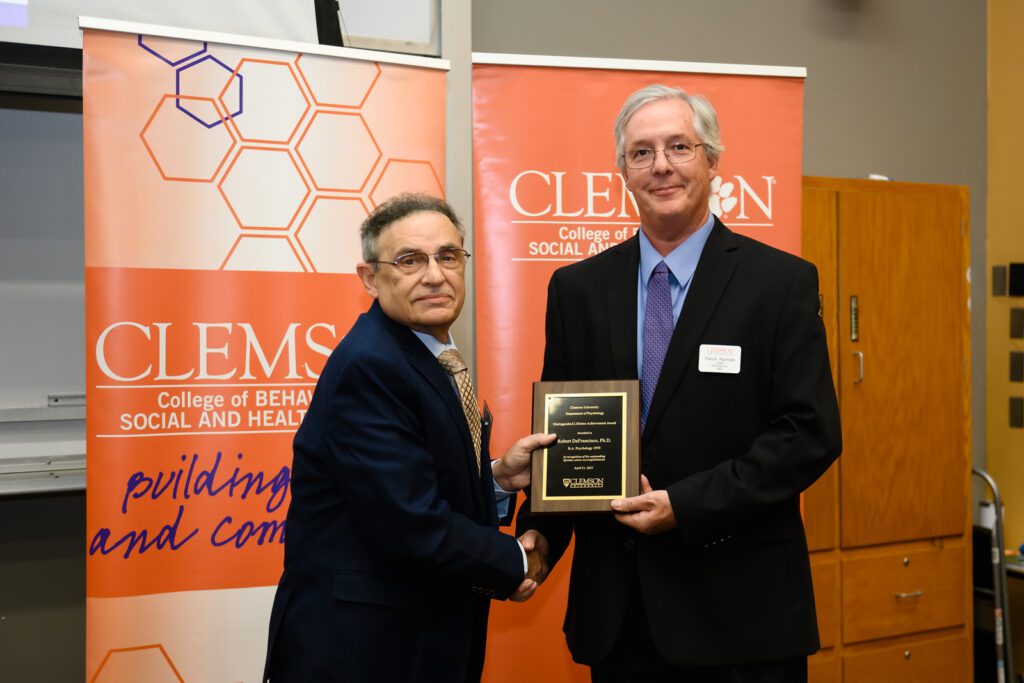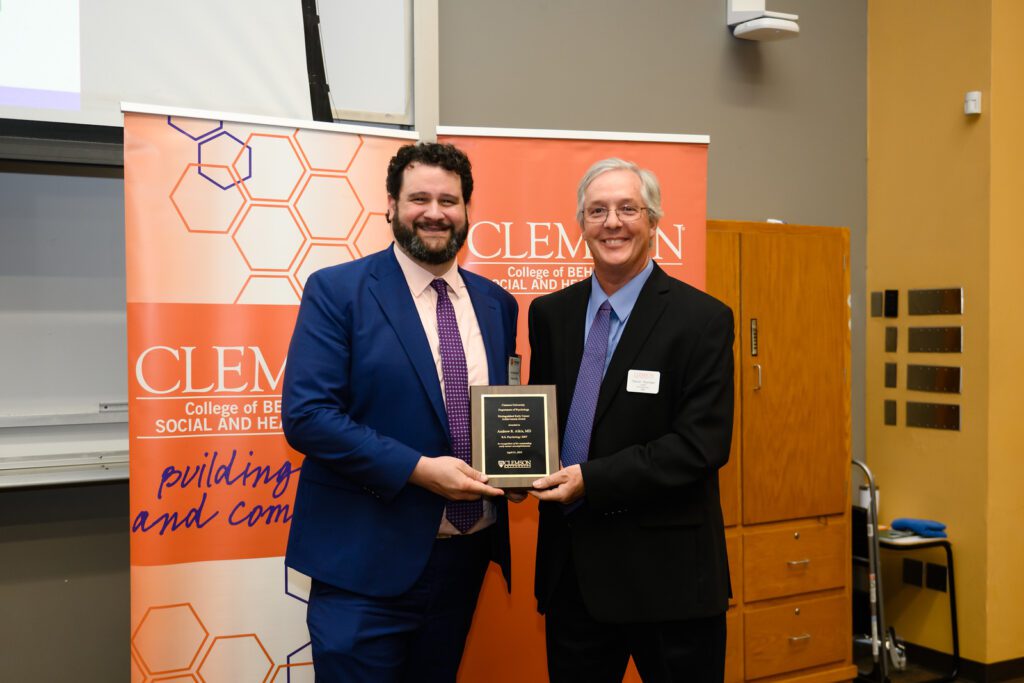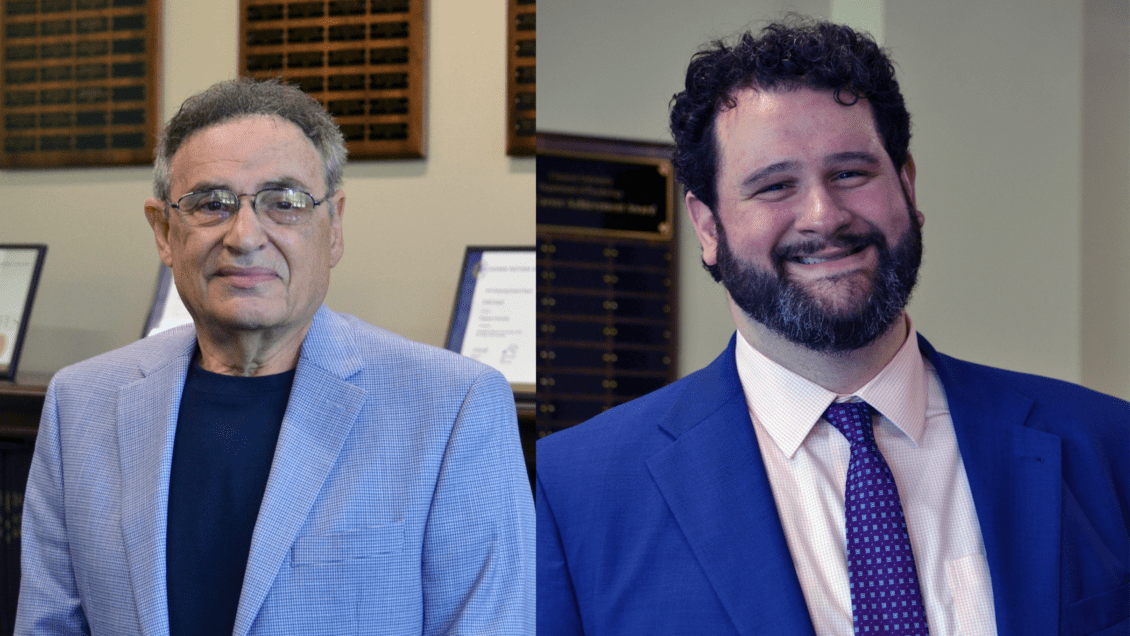A member of the first cohort of graduates with a bachelor’s degree in psychology and an alumnus who came through Clemson 33 years later were recently honored by the Department of Psychology.
Robert DeFrancisco received the Lifetime Achievement Award, which the department uses to recognize outstanding lifetime career accomplishments, and Andrew Alkis was awarded the Distinguished Early Career Achievement Award.
“Although Robert and Andrew attended Clemson during two very different eras, they are both shining examples of our long-term departmental philosophy to provide a challenging and engaging intellectual culture that prepares our students to thrive upon graduation,” said Department of Psychology Chair Pat Raymark. “We are incredibly proud of all their career accomplishments.”
Despite eventually pursuing careers in psychology, neither Robert nor Andrew started out in that course of study. DeFrancisco was recruited as a baseball player, and Alkis came in as an engineering major. But one class in psychology and great faculty set their future career paths in motion.
Robert DeFrancisco

Baseball brought DeFrancisco to Clemson, and an up-and-coming psychology department made him stay. At the time, they had a faculty of four, headed by Dr. Bernard Caffrey who recruited him to the newly formed bachelor’s degree program in psychology. Clemson now has a Ph.D. program and over 30 faculty members.
“Clemson was the cornerstone to my career,” said DeFrancisco, the first Clemson psychology graduate to receive a doctorate in psychology. “Being at Clemson taught me perseverance, hard work and loyalty. I am very humbled and honored to be recognized by my alma mater for this prestigious award.”
A Connecticut native, DeFrancisco moved down south for college and stayed in the southern United States for his entire education and career. With the encouragement of his late parents, Mr. and Mrs. Anthony DeFrancisco and Clemson Psychology faculty members Caffery & Davenport, DeFrancisco realized he needed to pursue an advanced degree in psychology. During his free time, he could be found in the psychology lab and library throughout his Clemson years. This dedication propelled him to receive a fellowship at the University of Southern Mississippi where he received his doctorate in clinical psychology.
He completed an internship at the Alabama Mental Health Institute and was then awarded a post-doctorate fellowship at the University of Kentucky College of Medicine. In 1995, he began taking courses in psychopharmacology which culminated in 2009 when he received a master’s degree in clinical psychopharmacology. In 2010, he became one of a handful of medical psychologists and was Board Certified by the Academy of Medical Psychology.
Inspired by his mentor, Dr. Billy Whittle, a family practitioner, DeFrancisco began his private practice at the Brewton Medical Center in 1977. In addition to working, he and his wife raised four children– one daughter with a master’s in education, another with her bachelor’s degree in nursing, another working as a nurse practitioner and his son working as a physician.
He currently has a Medical Psychology practice at DW McMillan Memorial Hospital. In addition to psychotherapy, testing and evaluation, as a general medical psychologist, DeFrancisco consults on medical adjustments and implementation at nursing homes and general hospitals. Further, he conducts disability evaluations, has been an adjunct professor, given numerous psychiatric workshops and is a board-certified forensic examiner.
“Life is about failing and succeeding, and I did my best to give my patients the skills to cope and deal with the issues in their life,” DeFrancisco said. “I am always positive with my patients when they come to see me and I tell them, ‘You have come to right place for help.’ It is so rewarding to see people change and make better choices in their life and know that I may have been able to help them with that development. My goal with every patient is to have them become their own therapist.”
DeFrancisco, a lifelong jogger and sports enthusiast, says he doesn’t know how to retire but is attempting to reduce his patient load. In addition to his private practice, he has found time to author several psychological articles and has recently finished a book entitled “Pharmacological and Non-Pharmacological Approaches to Nursing Home Care.”
DeFrancisco stated he is forever indebted to Caffrey and Davenport for their encouragement and guidance that launched his career.
“I have had a blessed life. I have been married to my best friend, Sandy for almost 50 years, had a great career and four lovely children,” he said. “This lifetime achievement award bestowed upon me by my alma mater is the ‘sprinkles on the ice cream.’”
Andrew Alkis

Alkis is a consultation-liaison psychiatrist who works with patients and families navigating the psychological toll of chronic medical illness, and the most rewarding part of his career is working with people.
“Sharing in people’s life stories, trying to understand their experiences so they feel a connection, heard and maybe even understood is the reward,” Alkis said. “Healing is a long process, but empathy – and feeling a little less alone – through the process can be extremely powerful and meaningful.”
This love of working with people and trying to help others is what inspired him to make the move to psychology. Once Alkis connected with his advisor June Pilcher, he said he felt like he was heading in the right direction for his career.
“This award means so much to me. I know I made the right decision to change course the way I did. If I hadn’t, I wouldn’t have met my wife, have two beautiful children, or be where I am today,” Alkis said. “Having that decision validated with this award is certainly nice, and I am very grateful for that.”
Once he changed his major to psychology, his personal experiences with mental health services helped him hone in on the exact path he wanted to take.
“I felt there was an over-reliance on medication and less focus on therapy,” Alkis said. “It seemed like the effort to understand a person’s experience wasn’t the priority as much as asking check-list questions about symptoms and brief medication management appointments. This bothered me, and I think ignited something within me, wondering if things could be different.”
After graduating from Clemson in 2007, he took one year off and then started at the Medical University of South Carolina. He finished at MUSC in 2012, and after 4 years in Charleston, he and his wife and traveled to Charlottesville, VA, where they completed their medical residencies. He finished his general psychiatry training in 2016 before completing his fellowship in consultation-liaison psychiatry with George Washington University in Fairfax, VA.
In addition to being a psychiatrist, he is also a clinical assistant professor with the Department of Psychiatry and Behavioral Sciences at MUSC. At the university, he sees college students through a collaboration with the College of Charleston Counseling Center. He also does telehealth, connecting with several other hospitals across the state, seeing medical/surgical patients who may need to see a psychiatrist while they are admitted to the hospital. He also teaches medical students, residents and fellows and is starting as associate clerkship director for the medical student psychiatry rotation this July. Despite living in Charleston, he still works with students at Clemson, as a telehealth psychiatric consultant at Redfern.
The Department of Psychology is part of the College of Behavioral, Social and Health Sciences, a 21st-century land-grant college joining together a unique combination of schools and departments: Communication, Nursing, Parks, Recreation and Tourism Management, Political Science, Psychology, Public Health Sciences and Sociology, Anthropology and Criminal Justice. These areas have distinctive characteristics and missions – all joined together by a common thread of service to people and communities.
Get in touch and we will connect you with the author or another expert.
Or email us at news@clemson.edu

